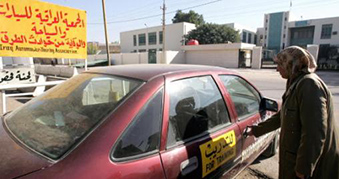
by Abbas Sarhan, Niqash, November 28, 2013
Only a few years ago a woman driving on the streets of Karbala was an unusual sight, one that some considered indecent and odd. But this has changed a lot, with more women driving and more locals considering it acceptable. And despite the city’s conservative ways, local authorities are now sending their female staff to driver education courses.
Local woman Ruqaya is proud that she was one of the first females, if not the first, to drive a car in the conservative Iraqi city of Karbala. She’s a school teacher and she was taking taxis to work every day. “This was costing almost one quarter of my salary,†she explained to NIQASH. “So I decided to buy a car. It was an old Daewoo and I bought it for US$3,000. In 2009, I sold it and bought a sportier model, a Kia.â€
That was in 2005. “It was strange to see a woman driving a car here,†she continues. “People often looked surprised or outraged when they saw it. And there were men who would make fun of female drivers and who made jokes about them.â€
Once when her car broke down, Ruqaya had to leave it next to a petrol station and she was jeered at by those who saw her predicament as she left the car.
Karbala didn’t have any actual laws forbidding women from driving and, unlike in some Gulf States, there has never been a fatwa, or religious edict, issued that forbids women from driving. But in Karbala, which is a seat of religious learning and also the home to some of the most important sites in Shiite Islam, it was expected that citizens would abide by the “rules of decency†and avoid any “forbidden actsâ€. For many, this meant that women should not be behind the wheel of a car.
However this has changed. “On the whole I think the people of Karbala are civilized in the way they deal with women drivers,†Ruqaya tells NIQASH. “And today there are dozens of women driving in the city. Some of them even drive to other provinces.â€
So many in fact, that in September this year, Karbala’s Directorate of Youth and Sport organized a training course on driving and car maintenance specifically for women. Twelve women took part in theoretical and practical lessons that included such topics as emergency breakdowns and better defensive driving. All 12 were employees of the Directorate itself because authorities there say they see an increasing need for their staff to be able to drive as well as increasing desire on the part of female employees. They hope to offer similar courses again in the future.
The Karbala authorities also announced that 30 women had submitted applications for driving licenses in 2011 and that this number had at least doubled by 2013.
“My colleagues and I used to wonder how women drivers could do things like replace their tires if they had a puncture,†says Jafar Saad, a Karbala cab driver. “They surely didn’t have the strength to deal with that. But over time, we’ve seen local women deal with all kinds of different circumstances and difficulties.â€
Saad says that local men have come to understand that it is normal for women to drive cars and they have no reason to fight the phenomenon.
Local clerics don’t seem to have a problem with it either. “It’s a personal choice and religion doesn’t need to put limitations on women drivers,†local cleric, Abdul Hassan Ibrahim, told NIQASH. “If a woman drives a car and respects the principles of decency at the same time, then there isn’t any problem. And especially if a woman is using a car to perform her household tasks.â€
In fact one Karbala man, Sadiq Abdullah, says he is happy for his wife to drive to work because this means she has less contact with strangers. “Women who don’t drive have to use taxis and buses or contract a driver, so they’re forced to talk to strange men all the time,†Abdullah says. “If women have their own cars they can preserve their privacy. So I don’t mind at all if my wife drives. And I don’t think anyone in our society minds either – things have changed a lot.â€
Sociologist Mohsen Reda believes this more relaxed attitude toward women drivers may also be due to the way that the city of Karbala has changed over the last few years. A lot of families have migrated to Karbala and many have come from more mixed, liberal communities like Baghdad. So this is a movement not only of people but of cultural mores, Reda says.
“Only a few years ago the indigenous population of Karbala saw female drivers as strange, indecent and even against religious principles. But in Baghdad and other cities like Basra and Hilla, it is totally normal to see women driving,†Reda explains. “When those families from Baghdad and other cities moved to Karbala they brought a set of values and behaviours with them – that includes a positive attitude toward women drivers.â€
“The women of Karbala have come to the conclusion that is not only natural for them to be allowed to drive, but that it is necessary too,†he concludes.
Abbas Sarhan is an Iraqi journalist, born in Basra in 1967. He graduated from the Faculty of Law of Basra University in 1992 and started working as a journalist in 1994. Sarhan has worked on social and political issues, writing for a number of newspapers published outside Iraq, including Baghdad, The Conference and Free Iraq. Sarhan has also worked as a radio journalist.